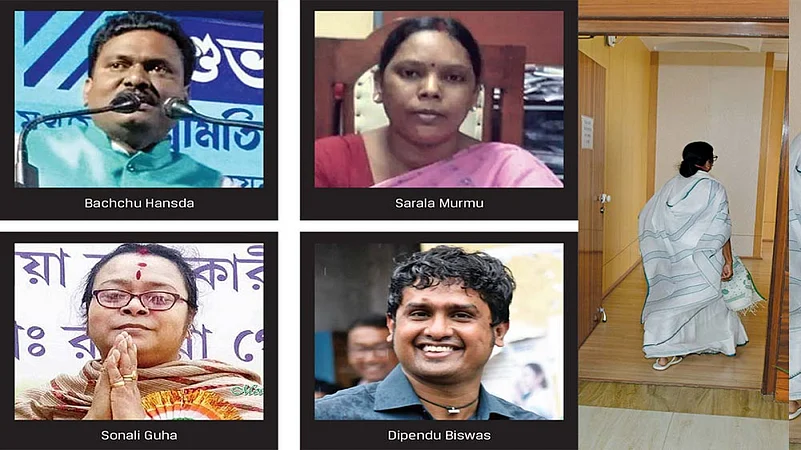In Bengal, this epidemic has earned the nomenclature of ‘suffocation syndrome’. The symptoms are distinct—feeling suffocated in the political party one belongs to at the moment and willingness to switch camp to serve people better. Ahead of the assembly elections, it was mostly leaders of the Trinamool Congress (TMC) who suffered from this. “Doley theke kaj korte parchi na”, roughly meaning there is no scope for work in the party, and “feeling suffocated” became oft-repeated excuses for politicians looking to jump ship, so much so that it generated a series of memes on social media platforms.
Now, after the elections, with Mamata Banerjee back in power with a greater mandate, it’s the ones in the BJP, including those who switched over from the TMC, to be affected by the suffocation epidemic.
One of the first to tender a public apology and place pleas before the party—through the media and social media—to be taken back was Sonali Guha, Mamata’s one-time confidante, who joined the BJP after the TMC denied her a renomination from her constituency. She tendered a public apology on Twitter for ditching Mamata ahead of the assembly elections and pleaded for being allowed to once again find shelter under the aanchal of Mamata’s saree.
Then it was the turn of Bachchhu Hansda, a minister in the second TMC government who was denied a ticket. Former India football captain Dipendu Biswas joined in soon after, making an appeal through the media and also writing to the party leadership. Sarala Murmu, who joined the BJP even after the TMC gave her a ticket, apparently because she did not want to contest from that seat, has made multiple appeals before the TMC leadership through the media since the results.
These were the ones whom the BJP did not give a ticket either. The TMC, now in an advantageous position, has decided to keep them waiting. The affliction, though, is not limited to those who did not find favour with the BJP. Even those who got the BJP ticket after switching camps have started singing tunes of discord.
Take Uttarpara’s former TMC legislator Prabir Ghosal, a journalist-turned-politician who was denied a renomination this time, switched camp and promptly bagged a BJP ticket. He lost and had been quiet since—until last week, when Ghosal said he was overwhelmed by Mamata’s political courtesy with the way she telephoned and enquired about the family after his mother died. He was also upset that the BJP’s state-level leaders did not enquire about her. The list will be endless if we consider panchayat, zilla parishad and municipal leaders who switched camp before the elections.
However, the one whose statements triggered the widest discussions is Subhrangshu Roy, not because he was a two-time TMC MLA before joining the BJP in June 2019, but because he is the son of Mukul Roy, Mamata’s one-time right-hand man who joined the BJP in 2017 and is now a national vice president of the party. While Mukul, who is still recovering from Covid-related complications at home, has been silent since the results, Roy Junior has been doing all the talking—from praising Mamata and her nephew, Abhishek, to discarding ‘divisive politics’ in Bengal and criticising the BJP’s role of unnecessarily criticising a newly elected government enjoying the popular mandate.
This is perhaps the most interesting of the developments because Mukul’s falling out with the TMC supremo has been widely attributed to the rise of her nephew through the party ranks since 2014. In fact, Mukul targeted Abhishek over a number of issues since joining the BJP.
Now that Abhishek went to see Mukul’s wife, Krishna, at the hospital where she is battling with Covid-related infections, described her as ‘Matri-soma’, or a mother figure, and exchanged pleasantries with Subhrangshu, is the ice between the Banerjee family and the Roys melting?
Whether Mukul will consider returning to his old party remains a widely discussed matter in Bengal politics, but there is hardly any doubt that he would have to accept Abhishek’s leadership in case he has any such plan. Less than five weeks since the election results, Mamata has further formalised Abhishek’s position in the party as the second-in-command—by promoting him from youth wing president to all-India general secretary. This post was held by Mukul until he left and was then taken over by Subrata Bakshi, another veteran TMC leader who has been among Mamata’s closest confidantes.
Mamata has made things clear—she will look after Bengal, while Abhishek is to lead the party’s national ambitions. Roy Junior seemed to have no problem in accepting Abhishek’s leadership. The question that is ringing the loudest among the leadership of both the TMC and the BJP is: would Mukul, who has been unhappy with a great number of issues concerning the BJP’s state leadership, consider working under Abhishek’s leadership?
“The party will keep most other turncoats waiting,” says a senior TMC leader. “They ditched the party at a difficult time and should suffer. But the party would be more than willing to take Mukul back, as it would definitely jolt the BJP. Most other turncoats do not matter, but Mukul does.”
By Snigdhendu Bhattacharya in Calcutta


























